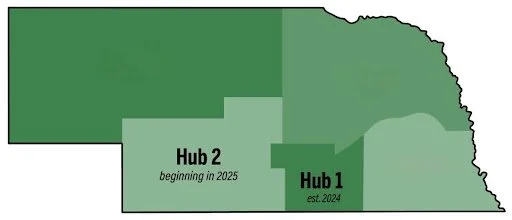MID-YEAR UPDATE
Who We Are—The NSHC is a 501(c)3 non-profit LLC (est. 2023) and is affiliated with the Nebraska Community Foundation (a national pilot).
Our Purpose—To advance producer-centered education, outreach, and the adoption of soil health principles to build resilient farms, ranches, and communities across Nebraska.
Our Mission—To collaboratively promote the adoption of soil health systems.
Our Vision—To collaboratively increase sustainable agricultural production and thriving rural communities.
Our Board—The NSHC Directors include: Craig Derickson, David Meyer, Mike McDonald, Paul Jasa, Bruce Johnson, Ken Herz, Jordan Uldrich, and Tom Hoegemeyer.
Our Strategy—We will establish and nurture at least five hubs across NE that represent the range of dryland, irrigated, grazing, and livestock systems across the ecological, climate extremes and economic drivers. Our steps are guided by our three prong, four metric model as detailed on our triangle and entail:
Producer-led learning and mentorship communities (P-2-P Learning Community),
Demonstration and Education Sites (DES), driven by the direct involvement of farmers, livestock producers, ranchers, and landowners seeking to enhance soil health and long-term, economic resiliency, and
Stakeholder Visioning Groups (SVG) involving community leaders—natural resources, medical, medicine, education, business partners, producers and the continuum of difference makers. Our approach applies “best practice” from neighboring states including South Dakota, Kansas, and Iowa. We focus on the social barriers, motivations, and soil health metrics that sustainably advance agronomic, conservation, and grazing progress.
We believe in the concept of ONE HEALTH—that soils and their biology are foundational to healthy plants, healthy animals, healthy food, and in turn healthy humans—all are interconnected.
Key Accomplishments
1. Hub Development and Engagement
Hub 1 in South Central Nebraska (10 counties) is active with five DESs: Green Cover in Bladen and in conjunction at Husker Harvest Days, three local farms, and a grazing system. The SVG continues to grow with support from local utilities, conservation groups, and education partners. The P-2-P Community has formed and participated in learning sessions. Producers discussed the results from their socio-behavioral and monetizing soil soil health interviews, respectively. The exploration of local barriers, incentives and soil health ROI will guide the relationship building in phase two.
The pilot group of producers in Hub 2 in Southwest Nebraska (16 counties) have begun phase one through environmental field work (Ecdysis) and the NE Farm Business Inc. will begin Economic Enterprise work in August. Each hub region seeks to represent its own unique crop and livestock systems as well as its unique range of community needs.
2. Strategic Partnerships and/or Funders
We are grateful for the funding, in-kind contributions and/or support of several organizations. Their support is important and not taken lightly. Our action steps are intentional to address overarching needs in NE. The following list is in process and oversights are not intentional (updated July 2025). The most current list is at—https://www.nesoilhealth.org/partners
3. Applied Research, the Application to Nebraska Communities and Ag.
The NSHC commissioned socio-behaviorist Dr.Julie Snorek to complete 30 in-depth interviews in Hub 1 to assess the community dynamics, incentives, and barriers to adopting soil health. She is beginning the second round in Hub 1 (south central NE; 30 producers) this September and Hub 2 (southwest NE; 20 producers) Phase I this Fall. These results will help the messaging, peer support strategies and SVG steps.
The NSHC also contracted with the Soil Health Institute (SHI) to conduct 20 economic interviews to analyze the financial case for soil health adoption in Hub 1. Phase 2 begins this Fall in Hub 1 (15) and Phase 1 in Hub 2 (15). The stories and data from these interviews form the foundation to educate NSHC members and stakeholders. Both reports have been shared and discussed with the producer learning community and will assist the SVGs. They also form a core part of our first “Celebration of Learning,” August 13th at Bladen which brings all groups, together.
We are excited to announce that the results, summary, and national model with the SHI were introduced this summer.
4. Organizational Infrastructure
The NSHC is formally incorporated as a Nebraska 501(c)(3) in affiliation with the Nebraska Community Foundation (NCF). This partnership builds mutual capacity and provides administrative, legal, and communication expertise.
Our staffing is adjusting to the ecological footprint across NE so we work as a locally driven organization to support the continuum of agricultural stakeholders and the changing dynamics of rural-urban communities. The addition of Ken Herz and Jordan Uldrich to our Board of Directors deepens our producer impact and builds relationships.
5. Communication and Outreach
We launched monthly articles through the Nebraska Press Association which are featured in local newspapers throughout Nebraska. We developed brochures and banners to engage prospective stakeholders and producer members. A new website was built: nesoilhealth.org. The “Stories of Success” series have begun to showcase producer transitions and outcomes as well as systemically strengthen the sustainability goals of various partners.
Next Steps in 2025
Exploring the environmental impact (Ecdysis) and economic enterprise scenarios (NE Farm Business Inc.) to enhance communities and opportunities. This will increase peer-to-peer relationships through tiered education tied to monetizing soil health and supporting producers through various means.
Developing the SVG to meet local-based priorities with water quality, markets, and human health.
Delving deeper into the role of livestock, various crop rotations, and steps to financially and technically support producers for sustained success.
Linking the P-2-P Communities and working with partners who impact many financial decisions.
Expanding the interviews to build comprehensive analyses and present “Stories of Success.”
Beginning the soil health benchmarking at the DES and other sites so we have a baseline.
Work with the NCF to explore the possibilities particularly with youth.
How can we help each other?
We each have a “why” that guides where and how we expend our time, treasures, and talents. The NSHC will not be successful without difference makers such as yourself. Please consider one of several ways to take action steps: become a member, donate toward developing a hub in your local community, and reach out to a Board member. It will be worth your time.


